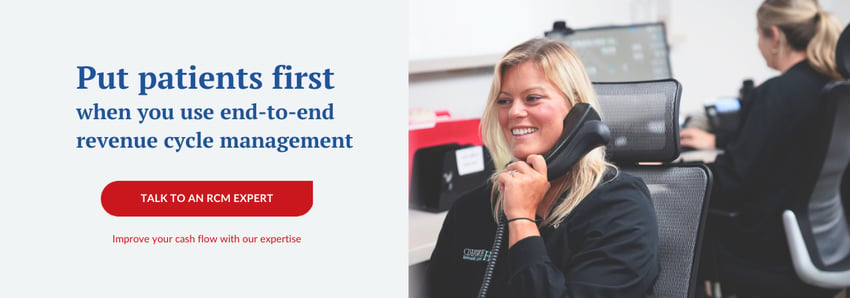Many oral surgery practices struggle with insurance billing. OMS procedures place special demands on the insurance billing process.
First, your treatments will involve medical and dental plans. Second, billers need to understand all the code sets available and know how to select the appropriate ones. Finally, you need to ensure that necessary supporting documents are attached for successful claims
These challenges with oral surgery billing can lead to a greater number of insurance claim denials. This means less money for your oral surgery practice, and more claims for the team to re-work.
In an oral surgery practice, access to billers experienced in oral and maxillofacial surgery can make a world of difference. We asked the experts in our oral surgery billing team to offer some guidance based on their experience.
That’s exactly what you’ll learn in this article: 4 tips for oral surgery billing. With these tips in mind, you’ll learn the importance of insurance verification, when to file a predetermination, why you shouldn’t over-code, and the importance of oral surgery billing education.
1. Insurance verification must be a #1 priority
In dental billing, insurance verification is important. And in oral surgery billing specifically, it’s paramount.
Make sure to get a copy of the patient’s medical and dental insurance cards, front, and back. Having a copy of their medical and dental insurance cards gives you the information required to obtain insurance verification, eligibility, benefits, and details about the specific coverage.
We all know insurance verification is the process of checking on the status of the patient’s insurance coverage prior to their first appointment. This ensures everything goes smoothly when you collect their out-of-pocket expenses and/or submit their insurance claim.
Insurance verification for oral surgery
When it comes to oral surgery, there are a few extra things to check for during insurance verification that will greatly impact the rate at which your insurance claims are accepted and paid.
When you’re calling the insurance company to verify the type of insurance plan whether it is a PPO or HMO and if your provider is considered in or out of network you must verify the plan specifics. Do not assume that because you're an in-network dental provider, you will automatically be a medical in-network provider as this is rarely true.
If a referral is required, then you may want to contact the patient’s primary care physician (PCP). They may have you fax over the details to the PCP.
Confirm whether the patient’s medical or dental insurance is primary for claim submission. Typically, medical insurance is always primary if there are any oral surgery benefits on the plan but it’s good to make sure this is the case during insurance verification.
Side note: If the patient’s treatment is related to an accident, the biller must use this information to correctly select the primary payer.
Knowing how to determine eligibility is essential to filing claims in the correct order. Making full use of medical and dental plan benefits is the OMS biller's main goal.
Here are a few things to remember when filing insurance claims for oral surgery
Because oral surgery deals with diseases that affect the oral and maxillofacial areas, your billing process must include the necessary supporting documents.
This means you are typically required to include a pathology report as an attachment to your insurance claim for a biopsy. The report may arrive after the date of service, but you will need to hold that claim until the pathology report is back.
For more on how our client-partners tackle OMS billing, download the case study below:
Make sure you know your anesthesia guidelines for each insurance plan you accept at your oral surgery practice. This helps you with claim approvals, and also helps keep you out of legal trouble.
And finally, as we mentioned above - every good oral surgery team will always get a copy of the patient’s medical and dental insurance cards when the patient first presents to the office. This is because insurance representatives aren't always 100% accurate in the information they give you during insurance verification.
2. File a predetermination during insurance verification
You should always file a preauthorization or predetermination pertaining to dental insurance at an oral surgery practice. This should be done proactively when the patient schedules the appointment rather than after.
Predeterminations are like a “pre-treatment estimate or pre-approval” claim that you submit to the patient’s insurance including proposed services not yet provided. In turn, the insurance company provides approval and an estimate of the amount the patient’s plan will pay and the estimated amount that may be the patient’s responsibility.

This may be accomplished via phone call. When you call the patient’s dental insurance, you should obtain as much information about the plan as you can. You must collect important information about copays and deductibles so you can help your patient plan for their financial arrangement.
It is important to note that a preauthorization of benefits is never a guarantee of payment by dental or medical carriers.
Predeterminations are important to obtain because dental insurance companies oftentimes will down code.
This means the predetermination may come back from insurance and give you an alternate benefit or a Least Expensive Alternative Treatment or “LEAT.” This could make the treatment less expensive for the patient.
We have seen a lot of downgrading from insurance companies so we recommend predeterminations for oral surgery billing - unless that patient is willing to pay upfront for that.
3. Don’t over-code on your insurance claim
When you're getting into hospitalization cases, a lot of oral surgery office teams don't know how to bill medical using the Current Procedural Terminology (CPT) and International Classification of Disease (ICD-10).
Keep in mind - when you are billing to the medical you will want to list the most expensive treatment first on the claim form and not the sequence in which they were performed.
When you’re unclear about billing medical as an oral surgery team, it’s common to over code symptoms on the insurance claim. Over coding is when you add too many ICD-10 codes to your insurance claim in order to explain what services were performed.
Related: Enroll in our ICD-10 Course in Dental Claims Academy
Unfortunately, over-coding causes insurance claim rejections.
You only code symptoms when there is no definitive diagnosis by a physician. This is information your team would need formal training on if there is confusion surrounding diagnosis coding. And spoiler - that’s our last big tip for you.
4. Stay educated on best practices
There are a lot of nuances involved in oral surgery billing. There are more factors to consider - pathology, anesthesia, when to file medical versus dental - and keeping up can be a challenge.
Formal training or education for your oral surgery billing team is a great way to create financial success for your practice. It can help your team avoid fraudulent claim filing.
There are more legal risks associated with oral surgery versus regular dental, so keeping up with your state’s legislation on dental and medical insurance is also important for your team. This means as a leader or practice owner, you should be investing in the continuous education of your billing team.
Or try to find some guidance for your billing team through outsourcing your oral surgery billing. This way you can lighten the workload of oral surgery billing for your in-house team and have billing experts handling your claim submission and follow-up.
Ready to bill confidently at your oral surgery practice?
With these tips for successful oral surgery billing, you’ll feel more confident with insurance verification, patient billing, claim submission, and compliance.
This can lead to a more empowered billing team that will help your oral surgery practice thrive.
Improve your claims income this week. In a brief free call, our consultants can show you how to make more money with less work. Discover how to get fast accurate insurance collection for oral and maxillofacial surgery teams,
If you’re still struggling to handle billing in-house, this could be a great resource for you and your team. Schedule a call with one of our oral surgery billing experts to learn more about how outsourcing can help you.
Related Posts
Dental revenue resources from Dental Cashflow Solutions (formerly Dental Claim Support)






